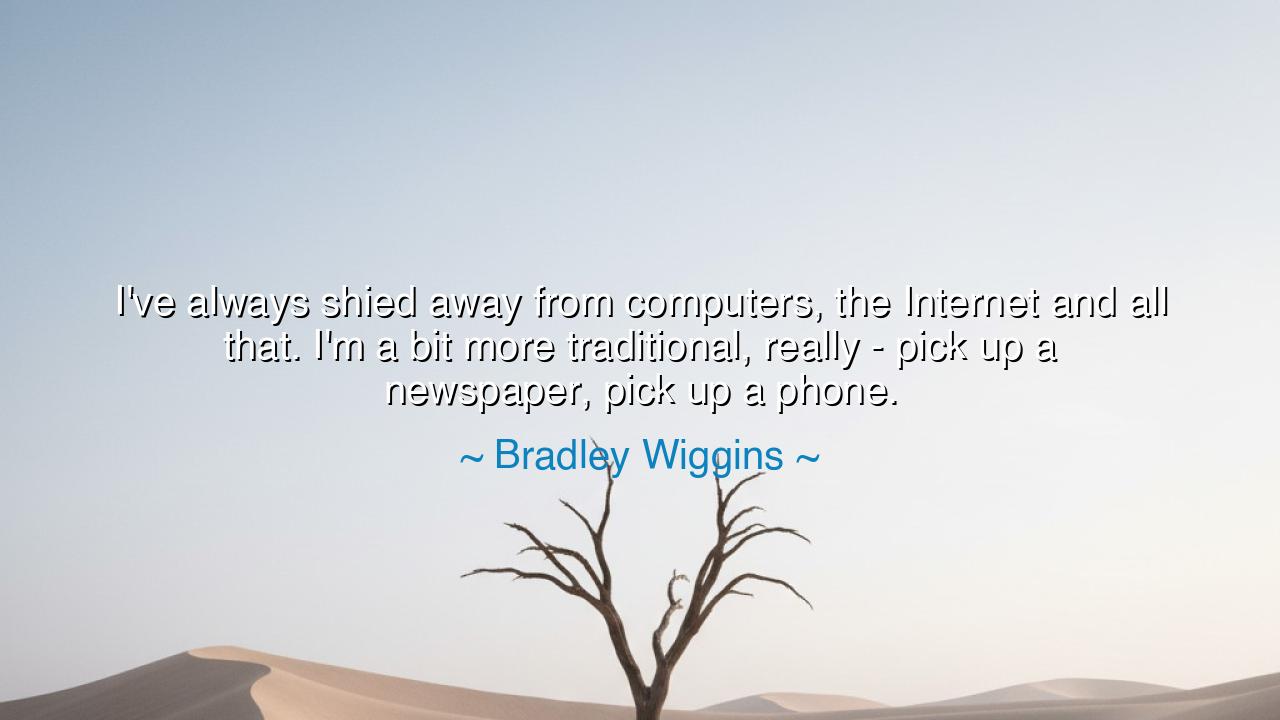
I've always shied away from computers, the Internet and all that.
I've always shied away from computers, the Internet and all that. I'm a bit more traditional, really - pick up a newspaper, pick up a phone.






In the humble and reflective words of Bradley Wiggins, we hear a voice of simplicity amidst the noise of a digital age: “I’ve always shied away from computers, the Internet and all that. I’m a bit more traditional, really — pick up a newspaper, pick up a phone.” At first glance, his words may seem quaint or nostalgic — the musings of a man out of step with modernity. But beneath them lies a deeper truth, one that speaks of grounding, focus, and authenticity in a time when the human spirit is often scattered by the endless hum of screens. Wiggins, a man of discipline and endurance, reminds us that not all progress is found in the glow of technology — sometimes, it is found in the quiet weight of paper in the hand, or in the warmth of a voice on the other end of a line.
From the earliest days of civilization, the ancients taught that balance is the key to wisdom. The philosopher’s scroll was not his master but his tool; the stonemason’s chisel was not his identity but his instrument. So too does Wiggins caution against allowing the machine to replace what is most human. He belongs to a generation that witnessed the rise of the digital realm — the transformation of communication, thought, and even memory into pixels and code. Yet he chose to remain anchored in what is tangible. To “pick up a newspaper” is to engage with the world slowly, to feel the texture of truth rather than scroll past it. To “pick up a phone” is to speak directly, to connect voice to voice, heart to heart — not through the fragmented messages of instant communication, but through the rhythm of conversation.
The origin of his sentiment lies in his nature and calling. As one of Britain’s most celebrated cyclists, Sir Bradley Wiggins built his life not in the virtual, but in the physical — on the open road, under the sky, powered by muscle, will, and breath. His craft required focus, patience, and solitude — qualities endangered by constant distraction. His avoidance of the Internet was not rejection of progress, but preservation of clarity. For in a world where every moment is interrupted by notifications and noise, he understood that to achieve mastery, one must first master attention. His words are thus not nostalgia, but discipline made manifest — a modern echo of the ancient principle that simplicity is strength.
Consider the story of Marcus Aurelius, the Roman emperor and Stoic philosopher, who ruled one of the greatest empires in history yet sought peace not in wealth or power, but in reflection and restraint. Surrounded by endless reports, letters, and intrigues, he chose to write instead in solitude, by hand, the meditations that would outlast his empire. He too “picked up” the simplest tools — pen, paper, thought — and through them found wisdom. Wiggins’ preference for the analog, like Aurelius’ writings, reveals a timeless truth: technology may connect us outwardly, but it often separates us inwardly. To slow down, to touch, to speak — these are acts of rebellion against the tyranny of speed.
In this light, Wiggins’ so-called traditionalism becomes not backwardness but balance. The ancients would have called it moderation — the virtue of knowing when enough is enough. The Internet offers infinite connection, yet endless distraction; it gives knowledge, yet often steals peace. By turning to the newspaper and the phone, Wiggins chooses presence over pretense, substance over spectacle. He lives not through the filtered reflections of screens, but through the tangible moments that give life its texture and depth. His way is not a rejection of progress, but a reminder that progress without grounding leads to emptiness.
His message also carries a quiet defiance — a call to remember that humanity existed long before technology defined it. We once learned, worked, and loved without the need for constant validation. The traditional ways — reading, speaking, walking, reflecting — are not obsolete; they are the foundations upon which wisdom still stands. To live as Wiggins describes is to reclaim agency in an age of automation, to declare that the soul must remain sovereign even as the world digitizes.
Let this be the lesson passed down: choose connection over convenience, depth over distraction. Pick up the paper and learn slowly; pick up the phone and speak earnestly. Let your mind breathe between moments, for wisdom grows in silence as much as in sound. As Bradley Wiggins reminds us, the world may race toward innovation, but the heart still finds peace in the simple, the physical, the real. The ancients knew this truth, and so does he: that life, in its purest form, is not lived through screens, but through presence — through the steady rhythm of conversation, reflection, and human touch.
And so, O listener, in a time when the digital tide rises high, stand firm upon the shore of simplicity. Let technology serve you, not rule you. Be not ashamed to choose the tangible, the personal, the traditional — for it is there, in the quiet rustle of a page and the sound of a voice, that the spirit remembers it is still human.






AAdministratorAdministrator
Welcome, honored guests. Please leave a comment, we will respond soon